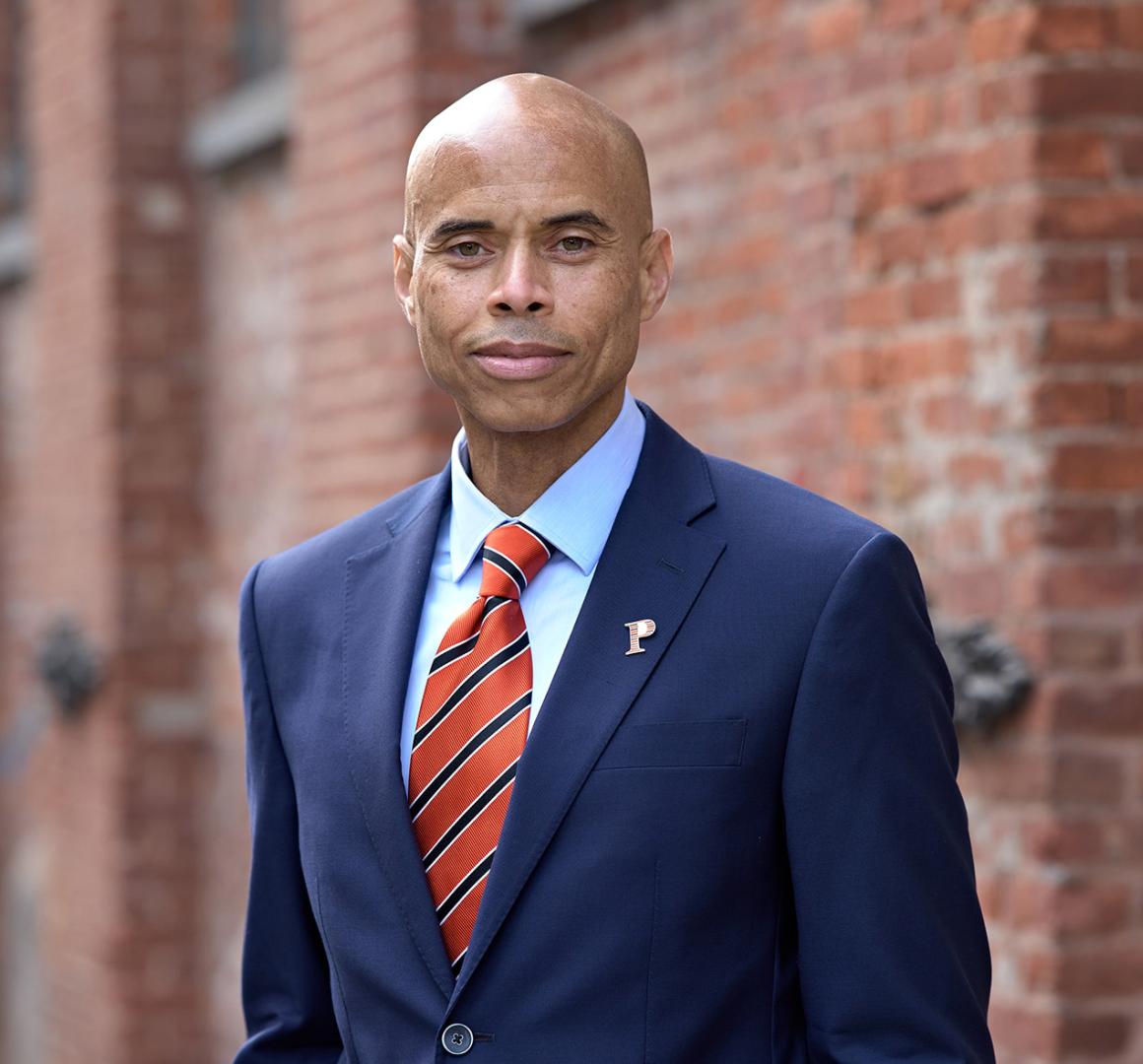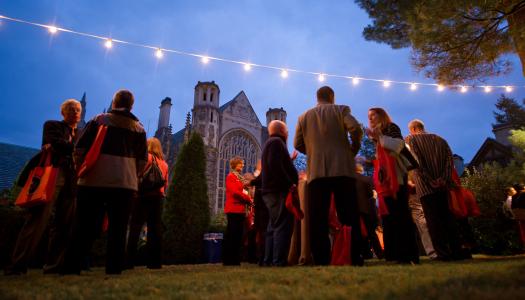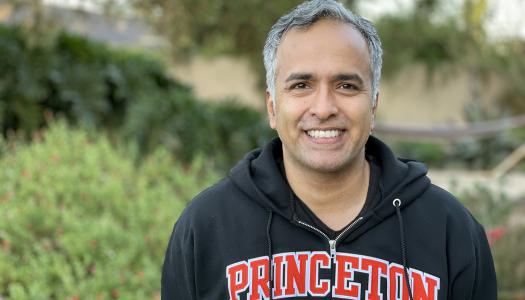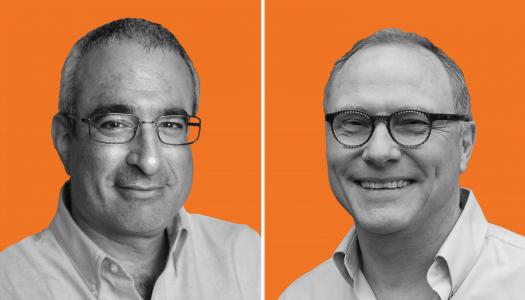Laurence Latimer *01 leads the Graduate School alumni community into a year of celebration

Photo by Steven Freeman
Laurence Latimer *01 hopes that next year’s “Many Minds, Many Stripes: A Princeton University Conference for Graduate Alumni,” will energize others the way the last such event, in 2013, impacted him. “I was looking for more community and that 2013 conference was really a catalytic moment for me,” said Latimer, an entrepreneur focused on financial technology.
As the new president of the Association of Princeton Graduate Alumni (APGA), Latimer wants to expand activities that invite graduate alumni to be more active. “There are many ways in which the graduate student experience has changed for the better over the last 15 years,” Latimer said, “and the broader alumni community has evolved to be far more welcoming and intentional at including those 30% of Princeton alumni who attended the Graduate School.”
The “Many Minds, Many Stripes” conference is scheduled for Oct. 9-11, 2025, and alumni are invited to participate in focus groups in nine cities and virtually to help inform conference programming.
In a new Q&A, Latimer reflects on his alumni experience and looks forward to the future of the graduate alumni community.
How has your engagement with Princeton evolved since you became an alumnus?
Like many graduate students, my connection to Princeton was principally through my affiliation with my school — the School of Public and International Affairs (SPIA). I had gone to a regional association event or two here and there, but it was very sporadic. In very real ways, the graduate alumni community, which represents nearly a third of all living Princeton alumni, wasn’t necessarily optimized for connectivity with the University or the broader alumni community. And it was the “Many Minds” conference in 2013 that served as a catalytic event for me.
How so?
I had done some volunteering with SPIA, but that 2013 conference was big. I think it might have been one of the largest non-Reunion grad alumni gatherings that Princeton had, and there was a session on volunteering. I just raised my hand and said, “I want to do more. Where do I start?” After that session, an alumna — Isabel McGinty *82 — came over to me and introduced me to several people — some undergrad, some grad alums — who were involved in different ways. And that was officially the start of the journey that led me to volunteer with the Princeton Association of New York City, with the Alumni Schools Committee and with Annual Giving. Without Isabel and her initiative, I doubt I would have the kind of service to the University that has become so meaningful to me. It was really that invitation at the “Many Minds” conference that opened up the universe and the prism from being connected to SPIA, which was very much in line with the graduate student experience at that time, to being connected to the University.
Did you attend the 2013 conference with this expectation or was it spontaneous?
I was certainly looking for more community across the University, and that conference was this moment where both sides — the alumni community and the University — were reaching out to each other. At least in my case, it sparked something in me to want to do more. My experience at Princeton fundamentally changed my life; it changed the trajectory of my life, professionally and personally. And I felt a great obligation to pay it forward, to do for others what had been done for me.
What kind of progress have you seen more recently with graduate alumni engagement?
As part of my role as president of the APGA, I had a very small part in orientation for incoming graduate students in August. It was so incredibly moving for me to be in Richardson Auditorium and see the almost 800 incoming graduate students — from all over the world and in all disciplines — sitting in a room having the shared experience of this introduction to this University that’s going to be so life changing for them. I didn’t have that experience when I was a student here. Back then, you went into your department, maybe you met with your faculty advisor, and that was the extent of your community. The Graduate School orientation has a dramatic impact on the way that current students identify with the University and the way that they will identify with each other. Something as simple as learning “Old Nassau” and some of the traditions that are almost like breathing for the undergrads are often new phenomena for graduate students. These are the sorts of things that create identity and are part of the DNA of what it means to be a Princetonian. Incorporating these traditions into the graduate student experience from the very beginning sets the tone for what it means to be a Princetonian.
I’ve seen a dramatic shift in the last decade, and I call out orientation as just one example. Having a graduate alum chair in regional associations is another; making sure that there’s someone locally who can represent the interests of grad alumni makes a difference. In Asia, graduate alumni often outnumber undergraduate alums in the regional associations, so there are clubs in Japan, India and Singapore, for example, we can look to as models for how to intentionally include our grad alumni in all things that are happening at the associations.
Do you have a vision or specific goals that you really want the APGA to tackle during your tenure?
It’s serendipity that I have the good fortune to serve as president during two incredible milestones for graduate alums and leading into a third for the University community. This year is the 75th anniversary of the founding of the APGA. Next year is the 125th anniversary of the incorporation of the Graduate School into Princeton University. And that leads into the 200th anniversary of the founding of the Alumni Association in 2026-27. In rapid succession, we have this opportunity to celebrate the things that make Princeton unique, whether it’s our Nobel laureates — about 20 of whom are graduate or faculty affiliated — or the Madison Medal, which is the highest award that’s bestowed upon a graduate alum of the University. There are all kinds of ways that we can celebrate Princeton in ways big and in ways small. We’re trying to use these upcoming milestones as moments to acknowledge the incredible strides that we’ve made as a community and use them as a springboard for even greater inclusiveness, community and connectivity going forward.
More than a decade ago, you raised your hand to volunteer, and next year, you’ll lead the APGA while the University hosts a new “Many Minds” conference. How does that feel?
It’s just an honor to be in the seat, and I’m just so fortunate that I’ve got a great team of folks who are on the APGA board. By some measures, the graduate alumni community is the most engaged that it’s ever been, and I’m looking forward to this conference next year being a catalytic moment for others like it was for me. The real work for the conference starts now, beginning with our focus groups. I’m really excited about being part of the planning committee and bringing “Many Minds” into fruition.


